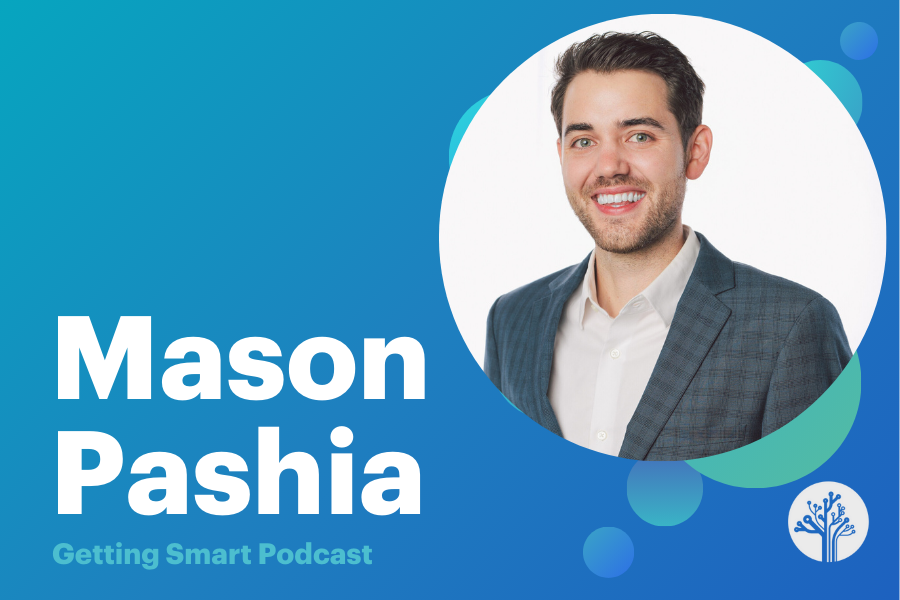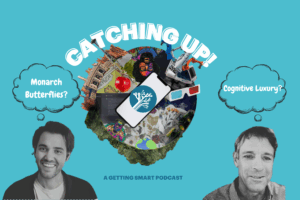Mason Pashia on Poetry, Art Pathways and Finding Home
Key Points
-
Words shape perception, and poetry encourages deeper attention and appreciation of the world.
-
Poetry, art, and storytelling are tools to explore identity, connect with others, and envision new possibilities.

Explore the fascinating intersection of poetry, art, and identity on this episode of the Getting Smart Podcast featuring Mason Pashia. Mason discusses his debut book, Kestrel and Other Songs, and dives deep into the creative process, the power of words, and the ways poetry invites us to see the world differently. From his inspirations like Robert Macfarlane to the influence of place and personal experiences, Mason shares insights that connect creativity with education, identity, and community. Tune in for a thought-provoking conversation that celebrates storytelling, imagination, and the transformative role of art in shaping how we view and engage with the world. Get your copy now!
Outline
- (00:00) Introduction to Kestrel
- (02:32) The Art of Poetry
- (12:00) Writing from a Place
- (15:20) Art and Education
- (21:45) Futures Thinking and Abundance
- (25:44) Closing Thoughts and Reflections
Introduction to Kestrel
Tom Vander Ark: Kestrel can either refer to a type of bird or a weather meter. The American kestrel is a small falcon known for this weird thing it does where it hovers before it descends on its prey. And the weather meter is a cool little handheld device that measures weather conditions. Kestrel is also the title of a new book, Kestrel and Other Songs, by our guest and producer Mason Pashia. Hey, Mason.
Mason Pashia: Hey, Tom, it’s good to see you.
Tom Vander Ark: I failed to say that this is the Getting Smart Podcast. Welcome to your own podcast.
Mason Pashia: Welcome to our podcast. Yeah, thank you very much for having me.
Tom Vander Ark: Kestrel is the name of your new book. And because it came out today, I’ve ordered a bunch, but I haven’t read Kestrel yet. Are you referring to the weather meter or to that little pesky falcon?
Mason Pashia: I am referring to the falcon. The weather meter is a great additional read on the book, but yeah, that poem in this book is a longer one, and the name matters in it.
Tom Vander Ark: Have you seen a kestrel in action?
Mason Pashia: Ooh. I don’t think consciously, no. Maybe though.
Tom Vander Ark: Where did your idiosyncratic fixation with interesting words come from?
Mason Pashia: I think that… So the longer version of this is that one of my favorite writers, Robert Macfarlane, wrote this book called Landmarks in 2016. And that book, in the beginning, talks about this impetus for writing, which is that every year the Oxford American Children’s Dictionary gets rid of words to make room for more words in the print edition.
And so in 2016, they got rid of the word “acorn” and the word “elm” and another word, and they added “MP3” and “megabyte.” And so, of course, he is an eco-person like myself, so that was a cause for alarm. But the thing that he argues in that book is that words are not just how we describe what we see—they shape what we see.
He talks about how there’s a word for the hole that an animal makes when they run under a bush, and over time that forms a hole. And he says, without the word, you never see the hole. So I think that is partially what I love about the hyper-specific, kind of strange words and why they catch my ear. There’s an inherent music to so many of them as well that I think we lose in common speech. But yeah, that’s kind of the more poetic version of why I love weird words.
The Art of Poetry
Tom Vander Ark: And you and I also share a love of alliteration.
Mason Pashia: True.
Tom Vander Ark: I see that showing up in your poetry. We’re going to talk about your new book, but speaking of alliteration, the four phases are Becoming, Burgeoning, Belonging, and Bursting. You just couldn’t help yourself.
Mason Pashia: I couldn’t. No.
Tom Vander Ark: For several years, you’ve been publishing a poem a week on intuwind.substack.com.
Mason Pashia: Yep. You can also just type in masonpashia.com, and it’ll take you there.
Tom Vander Ark: And how many weeks have you been doing this? Are you rivaling Tyler Cowen?
Mason Pashia: No, I think he’s got a couple of decades on me, but I’ve done it for five years—almost every week. An original poem or song. And it’s kind of morphed over time in terms of how I actually portray those. But it’s been a really generative practice, and I’ve been really grateful for the Substack community that I’ve sort of stumbled into on there. Yeah.
Tom Vander Ark: It’s that art of just shipping it, right? The creative tension of putting yourself on a deadline and then allowing words, observations, and experiences to rattle around and recombine themselves into a weekly poem.
Your poetry more broadly, but Into Wind is interesting because it often includes a picture.
Mason Pashia: Mm-hmm.
Tom Vander Ark: And then a set of notes. And many of the poems are observational in nature—not necessarily drawn from the immediate week, but from relatively recent experience. And I love how you frequently share the interesting and varied experiences that combine themselves into a poem. How did that form come together?
Mason Pashia: There’s probably some subconscious borrowing going on from other folks. There’s a David Whyte collection that has a little meditation on each page after a poem that I thought was cool. I think the poet purist in me, when I first started publishing on Substack—if you go back to the very first posts—there was no description afterward and no photo. And I was like, these two things take away from the poem, or they augment it in such a way that the poem ceases to be the poem.
With time, I got over myself a little bit and realized that’s not true. And then I really wanted to… I think so much of my own personal goal in poetry is to invite people into poetry. People often have a hesitation when something doesn’t make sense or they haven’t made meaning of it. So I thought, what can I do after a poem that starts to put pieces of meaning together without actually making meaning out of it? Because I don’t want to ever take that away from someone where they can make the poem mean something different to themselves.
But I do think that, for me, one of my favorite things about poetry has always been that the fingerprint of the poet is in the gaps between the images. The fact that you can go from a lemon on a table to building a fort to your wife to your grandmother in a poem is really telling about who you are as a person and the experiences you’ve had. So I want to capture some of those moments that I’ve had and then let other people kind of do the weaving of what it actually means to have them exist next to each other.
Tom Vander Ark: I love that. It reminds me of the first poem you wrote when you were 13. I think it’s called Can’t See Myself.
Mason Pashia: Yep. There it is.
Tom Vander Ark: Do you remember that?
Mason Pashia: Yeah, I do. I mean, it was a song, and I came downstairs and played it for my mom, I think. It was the first song that made her cry. The other ones were barely—I mean, they were technically songs, but this one felt like it was actually expressing something. And yeah, I wrote it when I was 13, and that’s where the title of the publication comes from. So it is a fun one, and I do remember it quite well.
Tom Vander Ark: Will you share it with us, or should I?
Mason Pashia: Yeah. So the chorus of that song is:
“Always walking into wind,
Blown back to the start again.
Forgot who I could be,
Now the boy again is me.”
And by the end of the song, it changes to:
“Now the man again is me,”
which is bold for a 13-year-old. But that is it.
Tom Vander Ark: A little bit of a Cat Stevens progression there.
Mason Pashia: Totally. Yeah. Father and Son.
Tom Vander Ark: I wanted you to share that because the “walking into wind” is, I think, an illustration of your earlier point that these poignant phrases land on each of us differently. Right? And so what you were sharing—when I heard “walking into wind,” I immediately went back to being a teenager up in the mountains in Colorado and feeling that brace of walking into the wind. And so it’s interesting how these fragments connect with images in our brain, and for each of us, that connection is different and personal, right?
Mason Pashia: Totally. And I think that was partially my hesitation with providing an image at all. I never wanted to override what came naturally. But at the same time, it’s kind of my only version of social media. I call it social media—it’s just like a weekly update. And I go to a lot of pretty places, so I wanted a repository for that.
Tom Vander Ark: I really appreciate you. You’re super thoughtful about all things, but I appreciate you unpacking the pros and cons of sending along those tidbits. For me, as a more occasional observer of poetry, I really love your notes and the chance to have a little bit of a counterpoint between how I experienced the poem and, in the sense of Parago Tomas, “read the poem, talk about the poem, read the poem again.” It gives me a chance to read it and react, then get into some background from you, and then go back and experience it again. And I really love that.
Mason Pashia: I appreciate that. Yeah, I think I’ve always been obsessed with the actual creative process. It’s also kind of the metacognition piece for me—actually understanding why that came out the way it did. When I sit down to write those notes, they’re always short, but they always take a long time to figure out. Like, what is it that I saw that possibly made me think of this thing? So I think it’s giving me a better understanding of what it means for myself to make art. I would never put that on anyone else, but I have heard from some folks that it’s been really interesting to see a peek behind the curtain of the process of making something.
And to that effect, the Into Wind piece—I just wanted to say this before we move on from that song when I was 13—that line, to me, was fully negative. Like, “always walking into wind” felt like you’re moving against something.
Tom Vander Ark: The headwind. Yeah.
Mason Pashia: The headwind. And now I think I’ve come to a place where it feels more like the wind is talking. It’s like the fact that it’s rushing past me—it’s like there’s so much to notice in that headwind. It’s just become a much more nuanced force. And I think that is something I look forward to with getting distance from these poems at some point too—looking back at how I initially processed them and being like, “Oh wow, I’ve actually changed a lot as a person,” or just, “I was approaching it from a totally different vantage.”
Tom Vander Ark: We’re talking to Mason Pashia. He’s the author of a brand-new book that came out today, Kestrel and Other Songs. Mason, you have a short kickoff poem?
Mason Pashia: I do.
Tom Vander Ark: Will you share that with us?
Mason Pashia: You bet. So this book is kind of concerned with my move from the Midwest to the Northwest. And so there are a lot of themes of migration and stuff like that in this book. This first poem is called From, and it’s kind of before all of the other sections. Here we go.
This is From:
“I was advised to write in windowless places,
Only loon grazing slope water.
A great log coasts on the back of mist
Coming down from the Olympics today.
A duck I’d never seen—
Blackhead with a white dot.
Golden eye. Diving. Diving.
I enter the roiling north estuary body,
Scream, giggling at the touch,
At the touch. Then the shivering arteries flood
After bracing.
Strange how it sits like a drug on the morning,
How the devils float on after leaving,
Dripping, coursing,
How the driftwood lingers.
If only one could write of a place from a place,
Then the poet.”
Tom Vander Ark: In David Whyte fashion, share that last line again.
Mason Pashia: “If only one could write of a place from a place, then the poet.”
Tom Vander Ark: Wow. That’s really beautiful.
Mason Pashia: Thank you.
Tom Vander Ark: We—you know, we live on Poverty Bay just south of Seattle. And so for my wife and me, I guess our favorite thing to do early and late is to sit out on the back deck and watch those fishing birds, big and small, dancing in and out of the water. And so you brought me back there.
Writing from a Place
Tom Vander Ark: I want to dive into the idea of writing from a place and of a place.
Mason Pashia: Yeah, I mean, I think that part of that is that it feels like since being here—and it could be a combination of place, it could be a combination of age—I don’t know what it is, but it feels like my brain has kind of been rewired since being here. It feels like it is more of an entangled being now than it once was.
And so I think that this collection is trying to grapple with that. Like, is that the—and the first line in the poem, which is, “I was advised to write in windowless places only,” Annie Dillard, who’s a really great writer, has basically written that down. She says, like, “I always go into a closet to write. I never want to see out the window.” And for me, I feel this interesting pull between both. I currently write at my dining room table, which has a view of not much, but the outdoor world and the occasional crow. And then I’m also torn by the fact that when I go backpacking or hiking, I always bring a notebook, sit on top of a peak to try and write, and just have nothing come out. It’s just like there’s sort of this bafflement in the moment where you actually can’t just use the tools to capture it.
And so it’s kind of in this tension of, like, what does it actually mean to write of a place or from a place? Is that a thing that you are currently inhabiting? Is that a thing that the place has done to you, and then it comes out of you later? So I think that’s kind of what it’s getting at at the end. And then that “then the poet” is just this propulsion force, I think, into the collection. But yeah.
Tom Vander Ark: This also reminds me of our partner Nate and his leadership around place-based learning. Nate really introduced the country, the world, to this idea of learning from and with a place in this multidimensional lens of thinking about economy, ecology, and culture in this integrated, synthetic way. And so your closing sort of invited me into that space of our work together as educators—really inviting them deeply into a place and allowing them to write from a place, of a place, to really find their expression in their place. Does that resonate?
Mason Pashia: Totally. We had a company retreat like 18 months ago or something, and Nate kicked us off with a great quick exercise that I’ve actually been using in my own life with other people when I get to a new place. I believe it’s: you find north from wherever you are, just directionally; you find home from wherever you are; and then you walk around and write down questions for five minutes that you have about the place. And I think it is such a great way to encounter place and to acknowledge that place is reciprocal—it’s a relationship. And so this idea of both “of a place” and “from a place” is kind of like, where have I come from to be here? That’s kind of like finding home from where you are now. And then other places—those questions that you’re asking about it—it’s like, what does it mean that I am here and that this land is here and who else is here or what else is here? So yeah, I fully buy it. I think his leadership in that has been amazing.
Art and Education
Tom Vander Ark: I want to talk about art. You came to work in education in part because of art—your love of art, your creative eye, and your interest in introducing that to young people. I want to acknowledge that some of that may have come from two extraordinary parents.
Mason Pashia: Yeah.
Tom Vander Ark: That are artists and designers.
Mason Pashia: I would’ve said that if you didn’t. Yep.
Tom Vander Ark: I think that cover art may belong to the one and only Rebecca Pashia.
Mason Pashia: Yep, she did. I’ve always used her art for other things in my life, whether that be putting out a song in high school or whatever—just a little snippet. And so for my first book, I wanted to make sure I caught a cool swatch. She does these really textural, abstract oil paintings. Anybody watching, maybe you can see it in this book here.
Tom Vander Ark: That’s beautiful. And if you move just a little bit, I think we’d get a glimpse of another one right there.
Mason Pashia: We got more paintings back there.
Tom Vander Ark: If you want to know more, check out pashiapaintings.com. We have a house full of Pashia and also appreciate your dad Scott’s eye for design and his real commitment to creating powerful learning spaces for the young people of America.
Mason Pashia: Totally. I think he was the person who taught me to see design in the natural world. I think that is sort of the bridge that I was able to make. Because ultimately, I think my entry into art was a little bit maybe different than a lot of folks, or at least the reason that I loved it. I think a lot of people find art to be sort of an emotional solace—it’s a place where they go to grieve or these… and that has happened for me, but that was not the reason I kept coming back. It was a place for me that felt like it was a way to train attention. It felt—and attention is something that I’ve always really been obsessed with, having control over my own and just being able to encourage others to kind of use it wisely, for lack of a better term.
So attention and appreciation were really my two entry points into art, as well as just the feeling that I got when I made something. I think that was the other real thread through it all.
Tom Vander Ark: I want to come back to that, but let’s go back to your entry point into education. You sort of entrepreneurially created a way to give kids the gift of a little bit of space to do and think about art. Is that right?
Mason Pashia: Yeah, I was working—I had an experience as a substitute teacher, and I thought it was very challenging and was not set up for success for myself or the students. So I wanted to create some curriculum that basically reinterpreted some of the standards through the lens of an artist, both to give artists some work and also to maybe open things up to students in a new perspective.
I was teaching poetry through music, which is, albeit a small difference, a difference in terms of how you approach them. And then I had a friend who wrote a curriculum on teaching geometry through pottery and a couple of other things. We were just going into classes and trying to kind of spruce things up and say, “Hey, maybe poetry’s never resonated with you, but if you look at it through this lens—more like let it happen to you first and then identify what surprised you in it—rather than try to make it a mathematical formula.” No shade to math, but that isn’t the best first step with poetry. Does it sit differently? And how do you feel about the medium then? So it was a really interesting, fun experiment in college and right after.
Tom Vander Ark: Our friends at Big Thought in Dallas have had some success introducing poetry, particularly spoken word poetry, as an entry point to that sense of identity development, right? Beginning to find your story, to tell your story.
Mason Pashia: Totally. And to have confidence using words for aspects of your story that either you don’t talk about much or you are communicating to a different audience. It’s very different to share your story with someone who’s not your close peer and the same age and experiences.
Tom Vander Ark: I bet even most of the folks that we work with don’t know this, but I met you because Scott invited me on a hike—your dad invited me on a hike in the desert—and we got into the subject of introducing kids to art and art and expression as identity development. And at the end, they said, “Do you want to work together?”
Mason Pashia: Yeah, it was incredible. No, I think we actually met—I called you randomly on a whim once before that hike because I think we had had a touchpoint before that. And at the end, you and I weren’t really sure why we were having the call, I don’t think. And so we kind of stumbled our way into it, and we landed at Parker Palmer at the end somehow. And we were both like, “Ah, yes, we now have at least the semblance of a bond.”
Shorts Content
Futures Thinking and Abundance
Tom Vander Ark: I think I want to pivot to futures thinking. You’ve become quite interested in, I don’t know, in the last five years, the last three in particular, in more intentional and structured ways about thinking about the future, about possible futures. Is there any link to poetry there? Where does it come from? Why is it important to you?
Mason Pashia: The thread between the two is probably something about imagination. I think that is a muscle that, to me, has always felt like it was inherent to humans. And then our current education system and other factors kind of drill it out of us young, and then it’s really hard to get it back.
And so I find these exercises in futures thinking primarily to be both very fun but also the product oftentimes is pretty useful in terms of helping to put your arms around something that otherwise you maybe wouldn’t have been able to. Adrienne Maree Brown has a great quote: “We live in someone’s imagined future, so we have to imagine a better one.” And I think there’s just real… the impetus to actually imagine something, to name it, to try and live in it now is so important if you’re ever going to actually have a North Star worth guiding toward. Otherwise, we just sort of stumble our way forward and end up with a similar set of conditions down the road, and we’re like, “Oh, I wonder how we got here.” So yeah.
Tom Vander Ark: Well, I appreciate that. I heard a quote last week that “the future’s not a forecast; it’s something we design.” So it feels like that impulse of being active, proactive, about designing, about being intentional, is part of where that comes from. What about abundance? You’ve become a bit of a sector leader on this topic. Did that emerge out of futures thinking? How did you end there instead of in complete despair? Because some people that wander into futures thinking end up on the Future of Life podcast talking about catastrophic risk.
Mason Pashia: There’s definitely a healthy dose of both of those in me—the positive and the negative. I think abundance for me is a thought experiment to try and name an approach. And so my role right now, or the one I’m telling myself I have, is sort of to be a liaison between the abundance work that’s going on—which is typically more policy and infrastructure building—and really make the case that that is very true in education as well. We’re facing a lot of the same obstacles. And I think we have come so far as a species that the fact that abundance isn’t the default is just sort of… it’s puzzling to me. It’s like, “Hmm, well, that didn’t happen. So what is actually happening?” So yeah, I think it’s interesting. I think it’s a useful movement to be a part of and try to see ourselves in right now.
Tom Vander Ark: We will do another podcast on that topic because I appreciate your leadership on that front. I think it’s quite related to what I think is the new priority called for by the context variables—to be entrepreneurial. The need and opportunity for invention, creation, and expression feel like we all have a new and better opportunity to engage in those forms of value creation, of creating value for ourselves and our communities. We’ve never really focused on that in education, and advancing that opportunity with a mindset of abundance, I think, can be a real gift to the sector right now.
Mason Pashia: Absolutely. I agree.
Closing Thoughts and Reflections
Tom Vander Ark: Read some of Kestrel for us. It’s a long poem best experienced aloud.
Mason Pashia: So Kestrel—this poem is an attempt to retell a classic story. And it’s a bit slippery as a result because there is some anchoring and contextual material. I’m not sure I’ll get far enough for you to recognize the story, but we’ll leave that for the listeners and readers to figure out. So this is the beginning of Kestrel:
“This dance, the one of wings designed,
Disintegrating the thrush and the lush rush,
Starbird over sediment and silt,
Breeze back.
I know her face as rivers carving shape,
And gorge surround her wared protrusion.
She waits, waits.
Verdant death, asunder in the shadow of sun,
Beneath the careful plotting of life and replication,
Beneath the careful plotting of pollination,
And the soft miss kiss.
Small footfall, small hymn hum.
Somewhere between lost and looking,
Belief is a precious thing to waste.
Whirl. Whoosh. How.
Through a hollow in a trunk,
Bonging, each tree ring.
Deep sound of time.
Deep time of sound.
All the earth and ear perceiving.
Crow joins in call,
Carrying freely along the trembly canopy,
Tinkling, brushing, dragging a cracked back branch sweep.
Here I must tell you that I am Kestrel’s brother,
Kin of Oak and Larksburg.
Kin of Rushing River.
Stir the dusty floor forest,
Phantom limb, forest nevermore,
Small footfall, small hymn hum.”
I’m going to stop there, but that’s the beginning of Kestrel.
Tom Vander Ark: Thank you.
Mason Pashia: I hope it resonates. That is the goal. The print version plays with space on the page a bit more, making it a little more dance-like. But yeah.
Tom Vander Ark: Wow. What a gift.
Mason Pashia: Thank you. Yeah, it was a very fun one to write. Part of the experience was bundling poems that have been written over five years together.
Tom Vander Ark: I guess as a poet, do you assume you have to do a book because poets have always done books? And books are usually collections. Did you come to that conclusion shortly after starting Into Wind?
Mason Pashia: I think it was a couple of years in when somebody new would subscribe, and I’d think, “They would never go back to the first three years of content. Why would someone go back in an archive that is coming out every week?” I feel like we see that with podcasts too. That’s such a challenge of the format—if you’re churning, then what is the benefit of the evergreen?
A book was a way for me to rebundle and add a new layer of meaning to these poems, to revise some of the ones that I thought were interesting but maybe not the ones for me right now. I decided to make everything lowercase with no punctuation throughout the book, partially for some philosophical beliefs about what I want to say in the book and also to transfer that movement of rush. With no punctuation, you can read it as slowly or as quickly as you’d like. Some of these poems have a tendency to sweep you up in them, and some less so.
But I also just love books. They’re an incredible piece of technology. They’re great to touch, great to bring with you. They become a companion. You can put your own thoughts in there and actually co-create with the book.
Tom Vander Ark: What’s your book platform? I’m curious about the form factor.
Mason Pashia: I did some research because I really wanted it to feel a certain way—not like a lot of self-published books, which are sometimes a bit too glossy or shiny. That’s not how I want to live with poetry. I went with a company called Bookmobile. They’re an online distributor. You can submit everything to them. I had to figure out how to do that and learn how to do book covers, which was not my favorite part of the process, but it was fine. They were great to work with, and then they just ship it to your door.
I decided I wanted to do a run of them, so I ordered a bunch and may order more in the future if I need to. Otherwise, I’ll be taking them around to some local bookstores in Seattle if you’re in the neighborhood to go looking.
Tom Vander Ark: Awesome. While we’re on that subject, where can people find it?
Mason Pashia: I’ll put a link more visibly on my Substack page, so that’s probably the best place to go—just masonpashia.com or intowind.substack.com.
Tom Vander Ark: Awesome. While we’re on that subject, where can people find it?
Mason Pashia: I’ll put a link more visibly on my Substack page, so that’s probably the best place to go—just masonpashia.com or intuwind.substack.com.
Tom Vander Ark: This connects to something that you and I talk about more weeks than not—this combination of thinking about your form of expression and then how to monetize it, how to share it, how to scale it. It feels like we have this… I don’t know. I have this sense that we have to teach entrepreneurship. We have to teach expression and entrepreneurship together because it’s really about having both an art form and a business model in mind. Does that feel too perverting to combine these thoughts about sharing across a platform? Is that icky or necessary in this new age?
Mason Pashia: I’ve been writing a very long essay on this question, so I’ve been sitting with it a lot lately. And I think it is… I think if somebody is especially going to college for art, you are doing them a disservice if you are not also teaching them entrepreneurship. The same goes for high school students who are expressing interest in art. I think you need to have that challenging conversation of, “Okay, if this is what you want to do full-time, great, but here’s some more stuff about business and entrepreneurship.”
I think there’s also a world of this where I have a bunch of things that I love in this world. Art and poetry are one of them, and I feel privileged to be in a place where I can kind of keep that afloat alongside all the other stuff that I’m doing in my life to where it is not such a cost-benefit analysis of making the thing or not. For me, it’s like, I want to make it, and I want to buy enough that I can give them away if I want to, or that if people buy them, that’s amazing.
But I think my underlying philosophy of this is that the best way to pay someone for art is to give to art in return or to art forward. It’s like this true reciprocity gift economy. So if this book got Tom Vander Ark writing poems again, like I think maybe happened once upon a time, that would be the greatest compensation for this book of all time. So I do think that is the thing that makes art so difficult in a marketplace—the subjective value and the fact that true payment of it is just to continue art forward.
Tom Vander Ark: Thank you for that. I think you have described the sort of ikigai view of guidance, right? Of coming to grips with what you love, what you’re good at, what the world needs, and what you can get paid for.
Mason Pashia: Hmm.
Tom Vander Ark: Some of those feel like compromising conclusions, but it does feel like a responsible way to encourage young people into the world with some sense of what they have to offer and what the avenues and entry points are for them to share their gifts.
Mason Pashia: Yeah, and I think that this is maybe a hot topic or questionable topic. I was talking with our now mutual friend Kara May about this last weekend. The thing for me that really solidified how I want to approach art going forward was I went to school for songwriting for a year and realized that it was not for me. And then I kind of had an identity crisis. I was like, I’ve always been the songwriter guy. I don’t know what to do.
So I spent some time looking inward and being like, I’m going to break songwriting into its component parts and then project each of them into the future and see if I would be happy doing it. One of them is guitar playing, one of them is singing, one of them is audio engineering, one of them is working at a label, and one of them is storytelling. And I ended up with storytelling. That was the thing that I was like, this is the piece that has to be the kernel in everything I do, or else I will get really burned out on it.
I’m so grateful that I did that exercise. That inward reflection of, “What is the actual kernel of the thing that I love in art, and how can I make that almost like a polyphonic life? How are you letting that show up in all these different places as you live and looking at it in different ways?” For me, I do storytelling in a lot of different ways now, and they all bring me a different kind of satisfaction and joy.
Tom Vander Ark: I was going to ask you how you think about identity—your identity and identity in general—but I think you’ve done a beautiful job of answering that.
We’re talking to Mason Pashia. He is a partner and creative director at Getting Smart. He’s a son of artists, a husband, a storyteller, a poet, and a songwriter. Mason, congrats on your first big book, Kestrel and Other Songs.
Mason Pashia: I really appreciate it. Thank you, Tom.
Tom Vander Ark: Kestrel and Other Songs. Buy it now.
We could do another hour on this, but I want to wrap it up just with a word of thanks for Mason. I really appreciate his professional and personal contributions. I love getting your poetry blasts every week. I encourage everybody to sign up at intuwind.substack.com or, as Mason said, masonpashia.com.
And thanks for joining your own podcast. That was fun. At this point, I usually thank you for producing this show, but the rest of the Getting Smart team appreciates you and all that you do. To our listeners, keep learning, keep leading, and keep reading and writing poetry. Let it slosh around in your life.
See you next week.
Links
Guest Bio

Mason Pashia










0 Comments
Leave a Comment
Your email address will not be published. All fields are required.